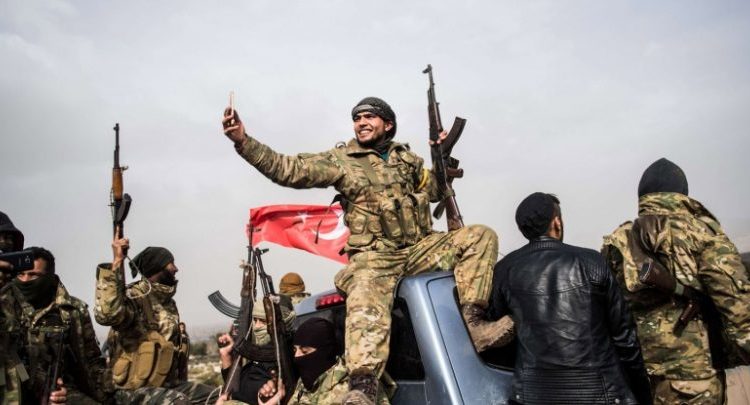Abdullah Bozkurt/Stockholm
The Turkish government has continued its practice of deploying Syrian fighters to Libya, replacing those whose contracts have expired with fresh fighters, according to a report submitted to the United Nations Security Council.
The report, prepared by the Panel of Experts on Libya and presented to the Security Council on May 27, 2022, noted “the continuous presence of Turkish-backed Syrian fighters in Government of National Unity-Affiliated Forces military camps in Tripoli.” There had been back-and-forth transfer operations of Syrian fighters to and from Libya, with those with expired contracts taken out of Libya and replaced by a new group, the report added.
Syrian fighters recruited by Turkey were paid between $800 and $2,000 per month. The presence of the fighters was confirmed by Libyan officials affiliated with the Government of National Unity.
The UN investigators found that Alaa al-Junaid, commander of the Hamza division of the Turkish-backed opposition Syrian National Army (SNA), visited members of his forces at the Tikbali camp in Tripoli on May 19, 2021. The visit was publicized in a YouTube video.
UN Security Council report includes evidence of Turkey’s deployment of Syrian fighters to Libya:
The report also incorporated remarks of SNA Colonel Fadl Allah Hajji, who said in an interview on July 18, 2021 that sending Syrian fighters to Libya was “part of a strategic plan of the cooperation between the SNA and the Turkish Army.”
Some Syrian fighters in Libya’s al-Yarmouk camp demonstrated in August 2021 against a delay in the payment of their salaries for over four months, putting roadblocks on the main road and setting fires at the entrance to the camp.
More evidence from the UN Security Council report:
Turkey’s deployment of Syrian fighters to Libya was considered by the UN to be an act that threatens the peace, stability and security of Libya or that obstructs or undermines the successful completion of its political transition. Syrian fighters as well as other foreign combatants and private military companies in Libya are still “a serious threat to the security of Libya and the region,” the UN underlined, lamenting that progress towards the withdrawal of foreign fighters is unfortunately hampered by the political stalemate.
Although Turkey denies its deployment of Syrian fighters to Libya, the Pentagon confirmed in July 2020 for the first time that Turkey sent between 3,500 and 3,800 paid Syrian fighters to Libya over the first three months of the year. The report on counterterrorism operations in Africa by the Pentagon’s inspector general noted that Turkey paid and offered citizenship to thousands of mercenaries fighting alongside Tripoli-based militias against troops of eastern Libya-based commander Khalifa Haftar.
In June 2020 UN rapporteurs sent a joint letter to the Turkish government seeking further information about its role in the recruitment, financing, transportation and deployment of Syrian fighters to Libya. According to the allegations in the letter, Turkey effectively deployed mercenaries to an armed conflict in Libya by recruiting, deploying and paying fighters, including children, from several Syrian armed groups to take part in military operations in Tripoli in support of the Government of National Accord (GNA).
Joint UN letter on the deployment of Syrian fighters to the armed conflict in Libya:
The UN letter also revealed how the Turkish government used its paramilitary contractor SADAT for those operations. “Turkish authorities allegedly contracted private military and security companies to facilitate the selection as well as the preparation of official and contractual documentation for the fighters, apparently in coordination with the Turkish security services. One of the companies cited in this context was Sadat International Defence Consultancy [SADAT],” the letter said.
In response, the Turkish government sent a letter in September 2020 rejecting the allegations as unfounded and accusing the UN rapporteurs of transmitting misleading and biased communications.
The evidence collected by the UN confirms, however, that it was the government of Turkish President Recep Tayyip Erdoğan that is misleading the public and lying about the deployment of Syrian fighters to Libya.
Turkey denied sending Syrian fighters to Libya in a letter to the UN:












